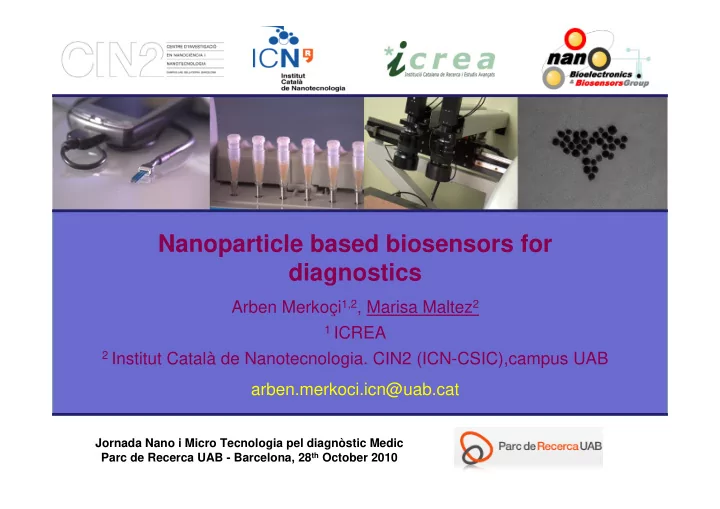

Nanoparticle based biosensors for diagnostics Arben Merkoçi 1,2 , Marisa Maltez 2 1 ICREA 2 Institut Català de Nanotecnologia. CIN2 (ICN-CSIC),campus UAB arben.merkoci.icn@uab.cat Jornada Nano i Micro Tecnologia pel diagnòstic Medic Parc de Recerca UAB - Barcelona, 28 th October 2010
ETSE (UAB), Bellaterra, 2010 Nanobioelectronics & Biosensors Group
Outline Introduction Diagnostics & Biosensors Electrochemical Biosensors based on Nanoparticles Detection tools Electrochemical detection of Nanoparticles Application: DNA hybridization detection Protein detection Tumour Cells detection Conclusions
Diagnostics & Biosensors Introduction Detection tools Application: • Time consuming DNA • Expensive equipments/materials • Specialized professionals Proteins Cells Conclusions • Portable Diagnostic Instruments • Self-Contained Diagnostic Kits • Ready-to-use Reagents • Small Laboratory Systems http://www.fluigence.com/ http://www.medicaldisposablespr.com/
Electrochemical Biosensors based on Nanoparticles Transducer Introduction Target Detection tools Signal Application: Easy to use DNA No Signal Low Cost Lower time Proteins Miniaturization Receptor Cells Conclusions Biocompatibility Potentiostat Rapid and simple chemical synthesis Excellent electroactivity Efficient coating by biomolecules Palm PC Electrochemical advantages Low sample volumes (30 μ L) Single use Miniaturization/portability
Au Au Cd Cd Current Current Detection tools: our technologies H 2 Au 2 H + Current Ag Au Detection tools Proteins Conclusions Introduction Application: Cells DNA
DNA detection based on NPs Introduction Detection tools Application: L.O.D. 0.198 μ g/mL • DNA DNA target Proteins L.O.D. 1.82 μ g/mL DNA target Biosens. Bioelectron. 2007 Nanotechnology 2009 Cells Detection through blocking of nanochannels Conclusions De la Escosura et al. Chem. Com. 2010
General platforms for protein detection AuNP/ α HIgG Ag + Ag + Ag + Ag + Ag + Introduction Au Au Au Au Au Au Au Au Au Au HIgG Detection tools Ag + Ag + Ag + Ag + Ag + Ag + ΜΒ/α -HIgG Au Au Au Au Au Au Au Au Au Au Au Au Application: DNA L.O.D. L.O.D. 23 fg/mL HIgG 1.45 ng/mL HIgG • Proteins De la Escosura et al. Maltez da Costa et al. Biosens. Bioelectron. 2009 Electrochem. Com. 2010 Cells Conclusions AuNP/ α HIgG-HRP HIgG ΜΒ/α -HIgG L.O.D. 65 pg/mL HIgG De la Escosura et al. Electrochem. Com. 2010 Ambrosi et al. Anal. Chem. 2007
Detection of HepB antibodies in Human serum Collaboration w ith Dr. A. González ( UV) Introduction anti-Hum IgG/AuNP Human serum Detection tools HBsAg Application: Superparamagnetic Micro beads DNA Using the catalytic effect of AuNPs onto HER: • Proteins L.O.D: 3 mUI HBV Ab / mL Cells De la Escosura et al, Biosen. Bioelectron. 2010 Detection of breast cancer marker (Ca15-3) Conclusions Project Valtec num ber 0 8 -1 -0 0 0 7 3 2.5 Specific Antibody /AuNP TMB O.D. (450 nm) 2 Breast cancer 1.5 marker 1 Specific Protein/ 0.5 Superparamagnetic 0 Micro beads 0 50 100 150 200 250 CA15-3 (U/mL) Ambrosi et al, Anal. Chem. 2010
Tumor Cell detection based on AuNPs Collaboration w ith Dr. A. González ( UV) Patent ICN/UVI: P1217E500 Introduction HMY: Tum oral A A hum an B H 2 H 2 2H + 2H + cell line w ith expressed HLA-DR Detection tools m olecules H + H + c c b b d d Application: a a H 2 H 2 2H + 2H + B B PC3 : Tum oral DNA hum an a’ a’ prostate cell line H + H + Proteins b’ b’ c’ c’ d’ d’ • Cells Using the catalytic effect of AuNPs Conclusions A A onto HER B B LOD: 4000 cells/ 700 μ L sample De la Escosura et al. Anal. Chem. 2009
Conclusions Introduction - Several platforms for DNA, protein and cell Detection tools detection are already available for laboratorial DNA use. Proteins - Further technological developments are Cells necessary for point-of-care applications. Conclusions - Collaborations with clinical labs and pharmaceutical companies are necessary for special applications & developments following the clinical / market needs.
Acknowledments Previous collaborators Current collaborators F. Airò (UM, Italy) S. Alegret (UAB, Spain) G. Alarcon. (UNAM, Mexico) R. Eritja (IBMB, C.S.I.C) A. Ambrosi (NIMS, Japan) E. Giralt (UB, Spain) M.T.Castañeda (UNAM, Mexico) A. Gonzalez (UV, Spain) P. Kara (EÜ, Turkey) Ü. Kirgöz (MU, Turkey) P. Moretti (UTV, Italy) F. Maran (UP, Italy) M. Pumera (NTUY, Singapore) C. Nogues (UAB, Spain) M. Sahin (Turkey) J. Pons (UAB, Spain) H.Takeda (USP, Brasil) M. Pudas (OU, Finland) J. Ros (UAB, Spain) J. Wang (SDU, USA) Financial supports
YOUR ATTENTION ! THANK YOU FOR
Recommend
More recommend